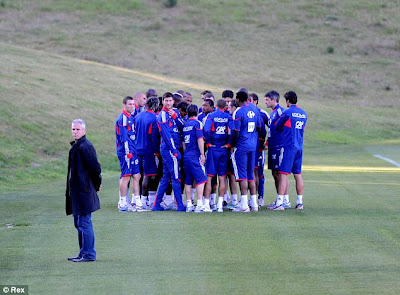The French team in 2010
You may remember that France was only able to advance to the World Cup after a deliberate Thierry Henry handball that went uncalled, led to the game-winning goal in a play-off game against Ireland. Once arriving at the World Cup, the French team tied Uruguay in their first group match, 0-0, and then lost to Mexico 2-0 in their second match. After that game, French forward Nicolas Anelka was kicked off the team for a profanity-laced tirade directed at head coach Raymond Domenech.
What happened next was pure insanity. The next day, Domenech's team refused to take the practice field in support of their banished teammate. The team's general manager/director marched off the field and resigned from the French Football Federation in disgrace.
French players huddled on the sidelines...
...while Domenech (white hair by the corner flag) faced the press.
The bizarre turn of events saw practice cancelled and, unsurprisingly, two days later the team lost their final group stage game to South Africa by a score of 2-1, thus, ending a disastrous World Cup campaign. Subsequently, Domenech was fired and, in order to quell fan uproar, the President of France Nicolas Sarkozy held meetings with a number of players to discuss the team's meltdown in South Africa.
Here's where rhetorical theorist Kenneth Burke steps in. Burke believed that in order to rid ourselves of guilt, we employ two rhetorical processes - victimage and self-mortification. So, in order to work towards repairing its national football image, first, the team - as well as the country of France - needed to find a scapegoat to burden with collective guilt and disappointment. Domenech served as one scapegoat, but to go even further, all 23 players from the World Cup team were suspended from the team's first post-World Cup match against Norway (France lost the away fixture 2-1). Furthermore, four of the more disruptive players from the World Cup were suspended from the French team for multiple games (Anelka was suspended for 18 matches).
The second part of the purification process, self-mortification involves what Burke calls "symbolic killing." Examples of this kind of mortification include things like New Year's resolutions or getting a drastically different hair cut or tattoo. These actions become transformative in some way, where the old persona is shed for a new one. In the case of French Football, their mortification process began just after the World Cup, when former French national team member - and 1998 World Cup winner - Laurent Blanc was introduced as the team's new coach.
But, it continued in today with the unveiling of a new team uniform. And not only is it a new uniform, but a new apparel provider. After 38 years with Adidas, the French Federation signed a 7-year deal worth roughly $56 million per year to wear Nike products.
The new Nike jersey unveiled on Monday is a stark contrast
to the 2010 jersey, at the top of the post.
Stitched on the inside of the jersey, behind the badge, reads the saying "Nos Differences Nous Unissent" (our differences unite us), a subtle reminder against the infighting that took place in South Africa as well as national racial tensions that have surfaced around the team's multicultural composition.
Furthermore, in the press conference announcing the jersey, Blanc spoke to the new persona of the team as a result of the jersey change:
"This jersey represents the spirit of French elegance, something recognized all over the world. The true collar, the new blue, the addition of the red really enhance the new kit. It goes well with the philosophy I want to create: creativity, humbleness, ambition."And, to cement the new kit with meaning, Nike has produced the following video that details not only the new product, but the team's "new philosophy" under coach Laurent Blanc.
To me, this is both obvious and fascinating. The next question is, will it work? Inevitably, as Kenneth Burke insists, any pursuit for perfection will let ultimately fail and the feeling of guilt will return, thereby initiating the process all over again. Even if France, and it's new philosophy, wins the next World Cup.




No comments:
Post a Comment